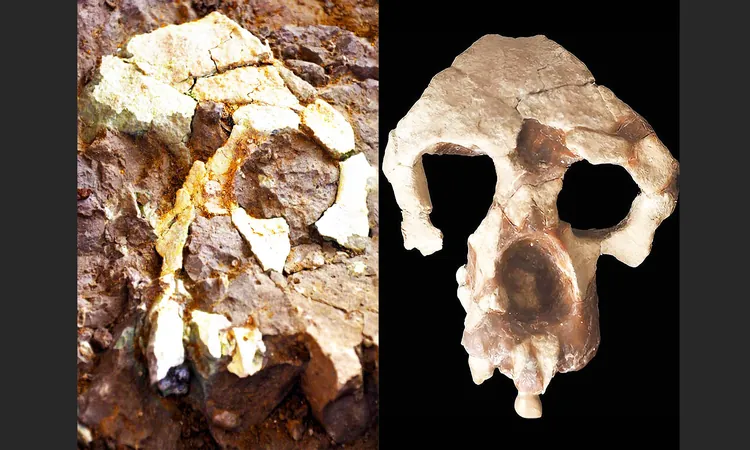
Discovery of Ancient Ape in Türkiye Could Redefine Human Origins, Suggesting European Roots
2024-12-15
Author: Yan
A groundbreaking discovery in Türkiye is prompting a major reevaluation of our understanding of human evolution. Scientists have unearthed a remarkable fossil of a new ape species, named Anadoluvius turkae, from an 8.7-million-year-old site near Çankırı. This finding is challenging the long-dominant theory that human ancestors evolved solely in Africa, and instead proposes that Europe played a much more pivotal role in our evolutionary narrative.
The fossil was excavated from the Çorakyerler site with the support of Türkiye’s Ministry of Culture and Tourism. Researchers involved in the study reveal that Mediterranean fossil apes were significantly more diverse than previously acknowledged, suggesting a complex tapestry of evolution in this region.
Rethinking Human Evolution: The European Influence
This discovery lends strong credence to the theory that the common ancestors of African apes and humans may have first evolved in Europe before migrating to Africa around 9 to 7 million years ago. Led by Professor David Begun of the University of Toronto and Professor Ayla Sevim Erol from Ankara University, the international research team meticulously analyzed the fossil, which features a well-preserved partial cranium that includes most of the facial structure and significant portions of the braincase.
Professor Begun states, “Our findings further suggest that hominins not only evolved in western and central Europe but spent over five million years evolving there and spreading to the eastern Mediterranean before eventually dispersing into Africa.”
The Life and Environment of Anadoluvius turkae
The newly identified Anadoluvius turkae was approximately the size of a large male chimpanzee, with an estimated weight ranging between 50-60 kilograms. This size is noteworthy, as it aligns closely with that of a female gorilla. The fossil indicates that these ancient apes likely thrived in open, dry forest environments—contrasting sharply with the dense forests inhabited by modern great apes.
These evolutionary adaptations suggest a unique lifestyle that included a diet of tough plant materials, likely obtained from roots and rhizomes, hinting at a significant ecological adaptation that shares parallels with early human diets.
A Key Piece in the Puzzle of Human Origins
What makes Anadoluvius turkae particularly noteworthy in the evolutionary timeline is its positioning among other fossil apes from the region, such as Ouranopithecus from Greece and Graecopithecus from Bulgaria. These fossils represent some of the best-preserved specimens, providing compelling evidence that hominins may have originated in Europe—contradicting the long-standing belief that they exclusively evolved in Africa.
“The evidence suggests a far more intertwined evolutionary story than previously imagined, challenging the views of those who argue against a European origin hypothesis,” says Professor Begun.
What Lies Ahead in This Evolutionary Journey?
While the significance of the Anadoluvius turkae find is immense, it does not definitively prove that hominins originated in Europe. There is still a call for additional fossil evidence from both Europe and Africa, particularly those dating between 8 to 7 million years old, to cement the connection between these two critical regions of human evolution.
The implications of this discovery are profound. If Anadoluvius turkae supports a European genesis for hominins, it could revolutionize our understanding of human ancestry and evolutionary pathways, prompting scientists to reexamine existing data and consider new hypotheses regarding where we truly come from.
Researchers are currently engaged in further analyses of this pivotal fossil, and their ongoing investigations will likely illuminate more about the evolutionary history of our species. The study documenting this exciting revelation has been published in the journal Communications Biology, paving the way for exciting new discussions in the scientific community about the origins of humankind.


 Brasil (PT)
Brasil (PT)
 Canada (EN)
Canada (EN)
 Chile (ES)
Chile (ES)
 España (ES)
España (ES)
 France (FR)
France (FR)
 Hong Kong (EN)
Hong Kong (EN)
 Italia (IT)
Italia (IT)
 日本 (JA)
日本 (JA)
 Magyarország (HU)
Magyarország (HU)
 Norge (NO)
Norge (NO)
 Polska (PL)
Polska (PL)
 Schweiz (DE)
Schweiz (DE)
 Singapore (EN)
Singapore (EN)
 Sverige (SV)
Sverige (SV)
 Suomi (FI)
Suomi (FI)
 Türkiye (TR)
Türkiye (TR)